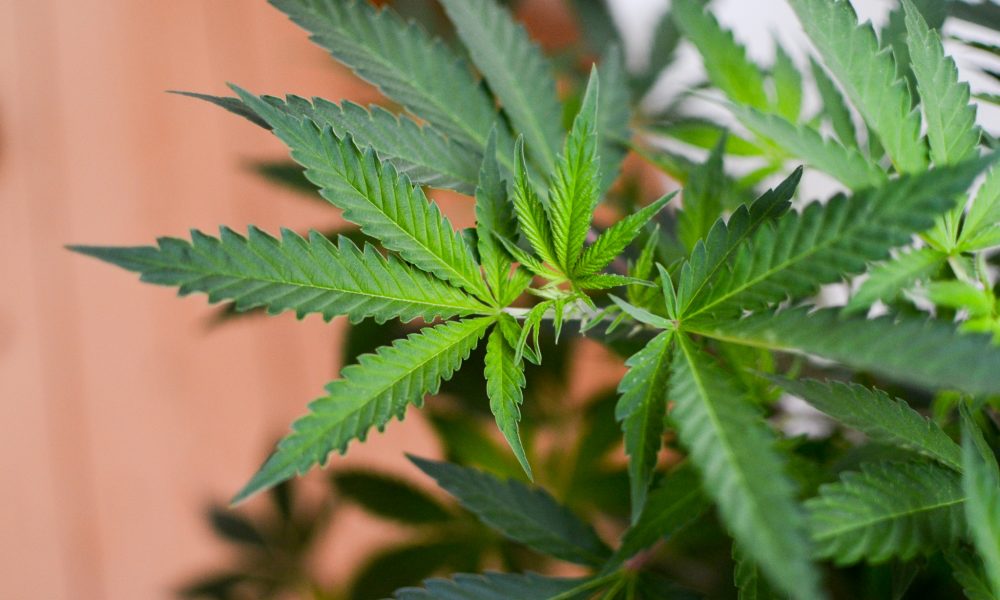With the passage of a bill to federally legalize marijuana in the U.S. House of Representatives on Friday, reactions to the development are pouring in from key lawmakers and drug policy organizations.
Friday marked the second time in history that a measure to end prohibition cleared a chamber of Congress. The Marijuana Opportunity, Reinvestment and Expungement (MORE) Act from House Judiciary Committee Chairman Jerrold Nadler (D-NY) passed along mostly partisan lines, 220-204.
A nearly identical version of the MORE Act passed in 2020, but it stalled in the Senate. It passed through the sponsor’s panel again this session in September. Now all eyes are on the Senate, where leadership is separately preparing to introduce a legalization bill but has faced sharp criticism for delaying reform.
“We’ve been here before,” Nadler said during a press briefing following the vote on Friday. “Unfortunately, the Senate failed to act. Sometimes I think we’d be better off if we didn’t have a Senate.”
“Now I renew my calls my colleagues in the Senate to actually address this issue—and I’m hopeful that they will heed this call,” the chairman said.
Here’s how lawmakers and organizations are reacting to the MORE Act passage:
I spoke on the House Floor today about why #WeNeedMORE. This is a matter of justice – decriminalizing marijuana at the Federal level will address systemic inequities & the disproportionate economic impact of the war on drugs on communities of color. https://t.co/k8Z0Q1Rkao
— Steny Hoyer (@LeaderHoyer) April 1, 2022
36 states and D.C. have legalized medical cannabis and 19 states and D.C. have legalized cannabis for adult recreational use.
If states are the laboratories of democracy, it’s long past time for the federal government to recognize legalization has been a resounding success.
— House Judiciary Dems (@HouseJudiciary) April 1, 2022
Criminal penalties for marijuana offenses, and the resulting collateral consequences, are unjust and harmful to our society. The #MOREAct comprehensively addresses these injustices. pic.twitter.com/mxNLysumiO
— House Judiciary Dems (@HouseJudiciary) April 1, 2022
The Marijuana Opportunity Reinvestment and Expungement Act (#MOREAct) would reverse decades of failed federal policies based on the criminalization of marijuana.
— House Judiciary Dems (@HouseJudiciary) April 1, 2022
The #MOREAct will:
➡️ Decriminalize marijuana at the federal level
➡️ Reassess marijuana convictions
➡️ Invest in local communities— House Judiciary Dems (@HouseJudiciary) April 1, 2022
🚨🚨🚨BREAKING: The House has PASSED the #MOREAct, which decriminalizes marijuana at the federal level, by removing it from the Controlled Substances Act. pic.twitter.com/OjHfqmiMcl
— House Judiciary Dems (@HouseJudiciary) April 1, 2022
I am thrilled to announce that the House has passed my bill, the #MOREAct, on a bipartisan basis! This bill reverses decades of failed federal policies based on the criminalization of marijuana by legalizing marijuana, retroactively expunging previous convictions and more. pic.twitter.com/RiaXfXOL50
— Rep. Nadler (@RepJerryNadler) April 1, 2022
Criminal penalties for marijuana offenses, and the resulting collateral consequences, are unjust and harmful to our society. The #MOREAct comprehensively addresses these injustices. I am proud to have introduced this bill.pic.twitter.com/ddzbE6TaYM
— Rep. Nadler (@RepJerryNadler) April 1, 2022
The House just took a huge step towards righting the wrongs of the war on drugs by passing the #MOREAct.
This bill decriminalizes marijuana at the federal level and expunges prior marijuana-related convictions and arrests for non-violent offenders.
I urge the Senate to act.
— James E. Clyburn (@WhipClyburn) April 1, 2022
Now that the bill has passed in the House, I urge the Senate to pass the #MOREAct!
This bill decriminalizes marijuana at the federal level and expunges prior marijuana-related convictions and arrests for non-violent offenders.
— Jim Clyburn SC-06 (@ClyburnSC06) April 1, 2022
Outdated laws keep #SmallBiz in the legal cannabis industry from accessing much-needed loans through @SBAgov.
The #MOREAct includes @NydiaVelazquez‘s provision to open up SBA lending to legitimate small cannabis businesses, helping them create jobs and support their communities. pic.twitter.com/RNQeNAbk7p
— House Committee on Small Business (@HouseSmallBiz) April 1, 2022
As @RepJayapal said in a statement, this is “a key progressive priority to end one of the most unjust vestiges of the racist war on drugs.”
— Progressive Caucus (@USProgressives) April 1, 2022
That’s why it’s so important the MORE Act doesn’t just decriminalize marijuana.
It also takes on mass incarceration by eliminating criminal penalties for manufacture, distribution, or possession of marijuana, and establishes a process to expunge marijuana-related convictions.
— Progressive Caucus (@USProgressives) April 1, 2022
Progressives have led the fight in Congress for marijuana justice for over 2 decades.
CPC members introduced legislation to ban federal interference with state medical cannabis laws in 2001, and co-founded the Cannabis Caucus in 2017, now led by @RepBarbaraLee & @repbluumenauer.
— Progressive Caucus (@USProgressives) April 1, 2022
Nearly 1,000 people a day are arrested for a marijuana-related crime, a rate of one person every 90 seconds.
Today, my colleagues and I are taking action to end the War on Drugs by voting on the most comprehensive marijuana reform bill ever introduced. #WeNeedMORE
— Rep. Barbara Lee (@RepBarbaraLee) April 1, 2022
A country where Black and Latino people serve harsh sentences while others make millions in profit from cannabis is unjust.
Today, I’m voting to end the criminalization of marijuana and begin investing in affected communities with the #MOREAct.
— Rep. Barbara Lee (@RepBarbaraLee) April 1, 2022
Federal laws regarding marijuana haven’t changed since the failed “War on Drugs” which hurt Black and Brown communities the most.
I’m proud to support the #MOREAct which will help to not only modernize our marijuana laws, but will help in the fight for racial justice. pic.twitter.com/jupmp3Nn15
— Rep. Nydia Velazquez (@NydiaVelazquez) April 1, 2022
I co-sponsored, voted for and support the #MOREAct. It legalizes cannabis, expunges cannabis related convictions, and taxes cannabis. More than half of Americans live in a state where cannabis is legal.
It’s time. Let’s do this. pic.twitter.com/UbyxKSgSfA
— Rep. Lou Correa (@RepLouCorrea) April 1, 2022
We’re long past due for the reforms in the #MOREAct. We must take action to end unjust marijuana policy, uphold states’ rights & ensure the safety & equity of legal businesses. The House once again took action to pass meaningful cannabis reform & I urge the Senate to do the same. pic.twitter.com/EPukeiGGIj
— Rep. Ed Perlmutter (@RepPerlmutter) April 1, 2022
Now is not the time for Congress to simply check a box on #cannabis reform. Yet here we are, voting on more-or-less the same, deeply flawed bill that barely passed the House last Congress and died directly thereafter.
— Dave Joyce (@RepDaveJoyce) April 1, 2022
Rather than further polarizing lawmakers whose consensus remains vital to progress, they’ve gone through exhaustive lengths to hone in on federal regulations for CAOA and build the bipartisan foundation necessary to pass impactful reform.
The MORE Act jeopardizes that foundation
— Dave Joyce (@RepDaveJoyce) April 1, 2022
We must give #cannabis reform the meaningful consideration it deserves so that we can pass progress that will be signed into law and improve the lives of millions. There is no more time to waste.
Read my full statement on the MORE Act here ⤵️ https://t.co/nwSBivsHjO
— Dave Joyce (@RepDaveJoyce) April 1, 2022
Over 14 million Americans continue to be impacted by state and local #cannabis charges – the MORE Act would do nothing to give them immediate expungement relief.
However, there are bipartisan proposals out there that would and we could’ve voted on those today instead.
— Dave Joyce (@RepDaveJoyce) April 1, 2022
Let’s get serious about reform, so we can pass real progress and enact it.
— Dave Joyce (@RepDaveJoyce) April 1, 2022
The MORE Act fails miserably to address the consequences of the legalization of marijuana.
If Congress isn’t careful about the legalization process, expect to see MORE cartel activity and illegal cannabis operations throughout the country, just like in my home state of Oregon. pic.twitter.com/bp54RL6Wen
— Congressman Cliff Bentz (@RepBentz) April 1, 2022
Today I voted to support legalization of cannabis at the federal level, but it needs to be done carefully & safely. The final bill included my commonsense amendment to ensure that we are doing everything we can to protect workers and kids. #PA17 pic.twitter.com/gafFmHKeSX
— Conor Lamb (@RepConorLamb) April 1, 2022
I support decriminalizing marijuana, taking it off Schedule I, and making important federal reforms so states can choose how to appropriately regulate these substances.
But the MORE Act is not the right way to do this.
Read my statement: https://t.co/GaDKWSJFmo 1/5 pic.twitter.com/oi6nvUFNiN
— Rep. Chris Pappas (@RepChrisPappas) April 1, 2022
We cannot have racial justice without drug decriminalization.
In addition to decriminalizing cannabis, the #MOREAct would invest approximately $3 billion to repair the decades of damage that the War on Drugs inflicted on communities of color.
— Rep. Bonnie Watson Coleman (@RepBonnie) April 1, 2022
I’m voting for the #MOREAct on behalf of the countless families that have been disrupted and destroyed by our nation’s devastating War on Drugs.
The #MOREAct would remove marijuana from the list of controlled substances and begin to repair the harm of discriminatory drug policy. pic.twitter.com/uJbrpI0p1U
— Rep. Bonnie Watson Coleman (@RepBonnie) April 1, 2022
The #MOREAct is a long overdue step in reversing the gross injustices caused by the failed War on Drugs.
I’m urging all my colleagues to join me in voting to finally decriminalize marijuana and bring sensible policy into place. pic.twitter.com/pXQxdxuGHt
— David Cicilline (@davidcicilline) April 1, 2022
Two-thirds of Americans support reforming our outdated, out-of-touch marijuana laws. It’s time for the federal government to catch up.
Today, the House passed the #MOREAct to end the criminalization of marijuana and begin investing in affected communities. pic.twitter.com/nwnyXbjyE9
— Congresswoman Mary Gay Scanlon (@RepMGS) April 1, 2022
People of color are 4x more likely to be arrested for marijuana possession than white people.
Today, I will vote for the MORE Act to decriminalize marijuana and to fund services and legal aid for those harmed by failed federal drug policies — especially communities of color.
— Congresswoman Madeleine Dean (@RepDean) April 1, 2022
Every 90 seconds, one person in this country is arrested for a minor marijuana crime.
Today, I’m voting to finally put an end to the criminalization of marijuana in the U.S. and begin repairing the harm of decades of failed drug policy.
#WeNeedMORE— Jan Schakowsky (@janschakowsky) April 1, 2022
Read More⬇️ https://t.co/HK4g5CsCsa
— Congresswoman Marilyn Strickland (@RepStricklandWA) April 1, 2022
Black people are arrested for marijuana possession at nearly 4x the rate of white people.
Decriminalizing marijuana at the federal level and expunging the records of those with convictions is a matter of social justice. That’s why today I was proud to vote to pass the MORE Act. pic.twitter.com/lsB1ckyEpA
— Rep. Pramila Jayapal (@RepJayapal) April 1, 2022
It’s time to end the federal prohibition of marijuana and expunge all prior offenses for use.
— Rep. Ro Khanna (@RepRoKhanna) April 1, 2022
A majority of Americans support legalizing marijuana. I voted in support of the MORE Act because no one should be behind bars for minor possession charges.
It’s beyond time to decriminalize marijuana.https://t.co/rcd6856ysH
— Rep. Mark Pocan (@repmarkpocan) April 1, 2022
Today I voted yes to the MORE Act, which would legalize, tax and regulate marijuana on the federal level. It’s already legal for medical use in 37 states and for recreational use in 18. It’s past time to act nationally. pic.twitter.com/a2Cqf7s82O
— Angie Craig (@RepAngieCraig) April 1, 2022
Decriminalizing marijuana = racial & economic justice.
Proud to support the #MOREAct in the House today & move us closer to ending the failed war on drugs that has ravaged Black & brown communities.
Our work to repair the hurt & harm of our criminal legal system continues. https://t.co/ZOO2FNpmE3
— Congresswoman Ayanna Pressley (@RepPressley) April 1, 2022
Today, I joined my colleagues in voting to legalize marijuana. It’s time to shift away from the racist, so-called War on Drugs. Legalization must come with equity & the repairing of harm that has been caused in Black & brown communities. The MORE Act is a step in that direction. pic.twitter.com/8KNBfj46Q0
— Congresswoman Rashida Tlaib (@RepRashida) April 1, 2022
Update: the Marijuana Opportunity Reinvestment and Expungement Act just passed! https://t.co/jn3uRLIhDS
— Rep. Ilhan Omar (@Ilhan) April 1, 2022
Proud to vote to pass the MORE Act today which would legalize marijuana and expunge past convictions. It’s time for the Senate to pass it too.
— Ilhan Omar (@IlhanMN) April 1, 2022
18 states have legalized recreational marijuana, yet marijuana possession accounts for the most arrested offense in the US.
The MORE Act would decriminalize marijuana, expunge records, & ensure equity in the cannabis industry.
We must end the racist War on Drugs. https://t.co/ZvipgRVF9N
— Congresswoman Cori Bush (@RepCori) April 1, 2022
Two-thirds of Americans support reforming our outdated, out of touch cannabis laws.
Today, @HouseDemocrats voted to end the criminalization of marijuana and begin investing in affected communities with the #MOREAct. Full statement: https://t.co/MdeoeZe7so
— Rep. Ted Lieu (@RepTedLieu) April 1, 2022
The MORE Act is supposed to make marijuana MORE legal but it creates:
MORE marijuana crimes
MORE federal taxes
MORE government spending
MORE central planning
Why not just get the Feds out of it?
— Thomas Massie (@RepThomasMassie) April 1, 2022
As co-chair of the House Addiction, Treatment, and Recovery Caucus, I have seen firsthand the devastating impacts of our current marijuana policy and the irreparable harm it’s doing, particularly to Black Ohioans and people of color.
— Congressman Tim Ryan (@RepTimRyan) April 1, 2022
I’m proud to stand on the side of justice in passing this bill today to begin righting the wrongs of decades of misinformed drug policy and make marijuana legal in all 50 states.
— Congressman Tim Ryan (@RepTimRyan) April 1, 2022
As part of the journey to ensure racial justice in America, we must decriminalize marijuana.
Today, the House will vote on the #MOREAct to finally decriminalize marijuana, and I’m proud to be voting yes.
— Congressman Jamaal Bowman (@RepBowman) April 1, 2022
We just passed the MORE Act. It would eliminate criminal penalties for cannabis offenses.
And expunge past federal cannabis convictions – addressing the detrimental impacts of decades of misguided drug policy.
It’s time we took a stand for equity in our justice system.
— Adam Schiff (@RepAdamSchiff) April 1, 2022
BREAKING: The House just voted to legalize marijuana nationwide!
Now, the Senate needs to do the same – so each state can set its own marijuana policies without the threat of federal intervention.
— Rep. Diana DeGette (@RepDianaDeGette) April 1, 2022
37 states – including FL – have said yes to some form of marijuana legalization & the People’s House listened. The #MOREAct would reform federal law to allow states to make their own decisions on cannabis, restore justice, aid veterans in chronic pain, & support small businesses. pic.twitter.com/CNItRTTWKX
— Congressman Charlie Crist (@RepCharlieCrist) April 1, 2022
Even after 47 states passed cannabis reform laws, more than 600,000 Americans are arrested each year for cannabis offenses.
I voted to pass the #MOREAct to address the disproportionate harms of cannabis criminalization & remove marijuana from the Controlled Substances Act.
— Joaquin Castro (@JoaquinCastrotx) April 1, 2022
Decriminalizing cannabis is a critical step for criminal justice and equity. I joined the House in passing the MORE Act to remove cannabis from the federal list of controlled substances & expunge convictions. #WeNeedMore pic.twitter.com/v4vwLe9Y5J
— Suzanne Bonamici (@RepBonamici) April 1, 2022
More than 600,000 Americans are still arrested each year on cannabis charges, despite reform laws passed in 47 states.
That’s why I voted YES on #WeNeedMORE. pic.twitter.com/Lg7jSIpRHp
— Rep. Gregory Meeks (@RepGregoryMeeks) April 1, 2022
Decriminalizing marijuana isn’t enough. We need to repair the harm done to communities of color. #MOREAct invests $3B over the next decade to provide job training, reentry services & legal aid to people harmed by failed drug policies. Cannabis reform is long overdue. #WeNeedMORE
— Rep. Hank Johnson (@RepHankJohnson) April 1, 2022
I voted YES on #WeNeedMORE because it will expunge the records of those harmed by cannabis criminalization, create opportunities for all to participate in the legal cannabis industry and decriminalize cannabis at the federal level.
— Rep. Ann Kirkpatrick (@RepKirkpatrick) April 1, 2022
Importantly, this bill will expunge marijuana arrests and convictions for a federal marijuana offense, which have historically and disproportionately impacted communities of color and low-income communities.
— Rep. Adam Smith (@RepAdamSmith) April 1, 2022
I look forward to voting ‘YES’ on the Marijuana Opportunity Reinvestment and Expungement Act and I urge its passage in the Senate.
— Rep. Adam Smith (@RepAdamSmith) April 1, 2022
A country where Black and Latino people serve harsh sentences while others make millions in profit is unjust.
Today, I voted to end the criminalization of marijuana and begin investing in affected communities with the #MOREAct.
— Brenda Lawrence (@RepLawrence) April 1, 2022
No, it’s not April Fool’s— today, NM opens recreational cannabis for business! I was proud to vote for this legislation in #nmleg, & today we’ll vote to decriminalize cannabis on a federal level! It’s long past time to address the injustice of the War on Drugs. pic.twitter.com/3FgqA7NS2K
— Rep. Melanie Stansbury (@Rep_Stansbury) April 1, 2022
We just voted to decriminalize cannabis in the House! I was proud to pass the MORE Act, which:
• Decriminalizes marijuana on a federal level ⁰• Begins to address the injustices of the War on Drugs⁰• Expunges federal marijuana convictions
Now it’s time for the Senate to act!— Rep. Melanie Stansbury (@Rep_Stansbury) April 1, 2022
Black, Latino, and Indigenous people have carried the brunt of marijuana criminalization while being shut out of the legal cannabis market.
Don’t tell me cannabis equity isn’t a racial justice issue. #WeNeedMORE— Congresswoman Nikema Williams (@RepNikema) April 1, 2022
As fentanyl pours across our open border and overdoses continue to mount, Pelosi Speaker would rather focus on legalizing marijuana than act to permanently classify deadly fentanyl as a Schedule 1 drug.
— Rep. Vern Buchanan (@VernBuchanan) April 1, 2022
In all seriousness, every 90 seconds, one person in this country is arrested for a minor marijuana crime.
Today, I’m voting to finally put an end to the criminalization of marijuana in the U.S. and begin repairing the harm of decades of failed drug policy.
#WeNeedMORE— Rep. Alma Adams (@RepAdams) April 1, 2022
Today, I voted in support of the #MOREAct to:
✅ Decriminalize marijuana at the federal level
✅ Reassess convictions
✅ Invest in local communities
✅ Allows financial institutions to service the industry— Jahana Hayes (@RepJahanaHayes) April 1, 2022
The #MOREAct would completely remove marijuana from the list of controlled substances and begin to repair the harm of discriminatory drug policy through expungement, resentencing, community reinvestment, and social equity.
Proud to vote YES today.
— Rep. Susan Wild (@RepSusanWild) April 1, 2022
Today, the House will vote on legislation to decriminalize marijuana and address the racial injustices of the failed War on Drugs.
It’s long past time to get this done.
— Rep. Shontel Brown (@RepShontelBrown) April 1, 2022
Decades of failed drug policies have harmed Black communities. Even today, some serve harsh sentences for marijuana use, while others make millions off the industry.
Proud to vote for the MORE Act to decriminalize marijuana and right this historical wrong.
— Rep. Shontel Brown (@RepShontelBrown) April 1, 2022
Marijuana reform laws have passed in 47 states, and federal cannabis decimalization is long overdue. Today, I voted for #MOREAct to end the criminalization of marijuana possession and use and begin repairing the harm of decades of failed drug policy.
— Congresswoman Julia Brownley (@RepBrownley) April 1, 2022
Every 90 seconds, one person in this country is arrested for a minor marijuana crime.
Today, I’m voting to finally put an end to the criminalization of marijuana in the U.S. and begin repairing the harm of decades of failed drug policy.
#WeNeedMore— Mike Quigley (@RepMikeQuigley) April 1, 2022
Every 90 seconds, one person in this country is arrested for a minor marijuana crime.
Today, I proudly voted for the #MOREAct to finally put an end to the criminalization of marijuana in the U.S. and begin repairing the harm of decades of failed drug policy. https://t.co/kcSTK8V4rT
— Rep. Marc Veasey (@RepVeasey) April 1, 2022
Every 90 seconds, one person in this country is arrested for a minor marijuana crime.
Today, I voted to finally put an end to the criminalization of marijuana in the U.S. and begin repairing the harm of decades of failed drug policy. #WeNeedMORE
— Rep. Susie Lee (@RepSusieLee) April 1, 2022
Two-thirds of Americans support reforming our outdated, out of touch cannabis laws.
Today, the House will vote on the #MOREAct to finally decriminalize marijuana.
It’s time for Congress to catch up. Cannabis justice is racial justice.
— Rep. Tony Cárdenas (@RepCardenas) April 1, 2022
Pleased to see the #MOREAct pass today after long supporting it in the House. This comprehensive reform legislation is a step forward to address the racial injustices caused by the criminalization of marijuana.
— Lloyd Doggett (@RepLloydDoggett) April 1, 2022
PASSED! The #MOREAct is a huge step forward for ending the racial injustices fueled by the failed War on Drugs.
— Congresswoman Nikema Williams (@RepNikema) April 1, 2022
Black, Latino, and Indigenous people have carried the brunt of marijuana criminalization for too long.
Today, I’m proud to vote in favor of the #MOREAct to decriminalize marijuana, reform our outdated cannabis laws, and begin to repair the harm of discriminatory drug policy.
— Rep. Veronica Escobar (@RepEscobar) April 1, 2022
I co-sponsored the #MOREAct because decriminalizing cannabis is central to criminal justice reform.
It is time we deal with serious racial disparity in sentencing, update federal law, and end discriminatory cannabis laws.
— Rep. Carolyn Bourdeaux (@RepBourdeaux) April 1, 2022
The #MOREAct would completely remove marijuana from the list of controlled substances and begin to repair the harm of discriminatory drug policy through expungement, resentencing, community reinvestment, and social equity.
— Bennie G. Thompson (@BennieGThompson) April 1, 2022
I’m geared up ready to pass the #MOREAct later this morning! Throwback to my visit to LivWell—the largest marijuana cultivation facility in my district. I learned all the new ways folks are using marijuana these days, from essential oils and lotions to everyday meals! pic.twitter.com/sgxcCjQoR7
— Rep. Andy Levin (@RepAndyLevin) April 1, 2022
Decriminalizing marijuana is a racial justice issue. The #MOREAct is long overdue. Let’s get it done. pic.twitter.com/vwABkFbrm4
— Rep. Andy Levin (@RepAndyLevin) April 1, 2022
We’ve got to go farther than simply decriminalizing marijuana. We need to repair the harm done to communities of color.
The #MOREAct would invest almost $3B over the next decade to provide job training, reentry services & legal aid to people harmed by failed drug policies.
— Rep. Andy Levin (@RepAndyLevin) April 1, 2022
Every 90 seconds, one person in this country is arrested for a minor marijuana crime.
Today, I’m voting to finally put an end to the criminalization of marijuana in the U.S. and begin repairing the harm of decades of failed drug policy.
#WeNeedMORE— Rep. Teresa Leger Fernández (@RepTeresaLF) April 1, 2022
Every 90 seconds, one person in this country is arrested for a minor marijuana crime.
Today, the House voted to finally put an end to the criminalization of marijuana in the U.S. and begin repairing the harm of decades of failed drug policy.#WeNeedMORE
— Congresswoman Marie Newman (@RepMarieNewman) April 1, 2022
The #MOREAct doesn’t just end the federal criminalization of cannabis – it also invests ~$3 billion over the next decade to provide job training, reentry services, and legal aid to people harmed by failed drug policies. Proud to vote yes today. #WeNeedMORE pic.twitter.com/Devu5A30xE
— Rep. Betty McCollum (@BettyMcCollum04) April 1, 2022
High-THC cannabis use has been shown to increase schizophrenia. “…we see links with schizophrenia, poorer cognitive function, substance use disorders, etc,” Hjorthøj wrote.https://t.co/mXBuxR9Vac
— Rep. John Rutherford (@RepRutherfordFL) April 1, 2022
While there is clear, scientific evidence that cannabis can help those with certain medical conditions, complete legalization with no guardrails will only make individuals and communities less safe.
— Rep. John Rutherford (@RepRutherfordFL) April 1, 2022
Today, I voted to decriminalize marijuana at the federal level. It’s time we end the war on drugs and take long overdue steps to address the devasting injustice surrounding marijuana incarceration and the vastly disproportionate impact it has on communities of color.
— Rep. Haley Stevens (@RepHaleyStevens) April 1, 2022
Proud to vote YES on the #MOREAct today.
California decriminalized in marijuana in 2016 to begin repairing the harm of discriminatory drug policy through resentencing & reinvesting in our communities. We need the rest of our country do the same. #WeNeedMORE https://t.co/Q77ZPzGq2A
— Rep. Salud Carbajal (@RepCarbajal) April 1, 2022
Today, I helped pass a bill to decriminalize marijuana. It would expunge marijuana arrests and give these Americans a fresh start. Also, marijuana helps veterans handle chronic pain and PTSD. I hope the Senate passes it soon.https://t.co/0xD91l3bHI pic.twitter.com/nI4JwIdunk
— Rep. Donald Payne Jr (@RepDonaldPayne) April 1, 2022
A country where Black and Latino Americans serve harsh sentences while others make millions in profit is unjust and unacceptable.
That’s why I voted today to end the criminalization of marijuana and begin investing in affected communities with the #MOREAct. https://t.co/0b7GyUTm2P
— Rep. Emanuel Cleaver (@repcleaver) April 1, 2022
For decades, the War on Drugs has devastated Black & Brown communities.
That’s why I voted for the #MOREAct, which would decriminalize marijuana on the federal level and expunge the records of those harmed by these failed drug policies. pic.twitter.com/V9Sew5JoMv
— Rep. Jimmy Gomez (@RepJimmyGomez) April 1, 2022
It’s past time we decriminalized weed + expunged nonviolent marijuana convictions so that the communities destroyed by the failed War on Drugs may finally begin to heal. That’s why I proudly voted YES on the Marijuana Opportunity Reinvestment + Expungement Act.
— Sara Jacobs (@SaraJacobsCA) April 1, 2022
Since the first anti-marijuana laws & throughout the war on drugs, marijuana policy has been constructed according to racist & anti-immigrant biases. Even the drug’s name ‘marijuana’, was popularized amid efforts to negatively associate the cannabis plant with Mexican immigrants.
— Congressman Chuy García (@RepChuyGarcia) April 1, 2022
In recent reporting from Chicago, Latino and Black individuals still accounted for 95% of marijuana-related arrests.
— Congressman Chuy García (@RepChuyGarcia) April 1, 2022
The pandemic has produced a rise in drug abuse, violent crime & other indices of collective trauma.
These are the issues that must be law enforcement’s top priority.
We must stop wasting precious resources on non-violent marijuana crimes. Proud to support the MORE Act today. pic.twitter.com/mClwDzw2WZ
— Congressman Troy A. Carter (@RepTroyCarter) April 1, 2022
It is simply wrong that Black and Latino Americans serve harsh sentences while others make millions off a new and growing industry.
By passing the #MOREAct, the House is taking critical steps to end an injustice and has plagued our judicial system for generations.
— Rep. Terri A. Sewell (@RepTerriSewell) April 1, 2022
NEW: the House just passed legislation to federally legalize marijuana. The bill, introduced by @RepJerryNadler, would also retroactively expunge past convictions, a major and long-overdue advance for criminal justice reform.
I voted YES; the final vote count is below. pic.twitter.com/fs6F0nfaeD
— Rep. Don Beyer (@RepDonBeyer) April 1, 2022
If we are serious about criminal justice reform, we must end the federal prohibition on cannabis and expunge low-level convictions that disproportionately harm communities of color!
I am proud to co-sponsor this important legislation that just passed the House today! #MOREAct pic.twitter.com/H6AGDIuL7q
— Carolyn B. Maloney (@RepMaloney) April 1, 2022
I voted no on the MORE Act, which would decriminalize and de-schedule marijuana without any health and safety protections or a way to crack down on illicit cannabis sales.
— Markwayne Mullin (@RepMullin) April 1, 2022
Instead of de-scheduling marijuana, we should focus on permanently scheduling deadly fentanyl and it’s analogs crossing through our Southern border at record rates.
— Markwayne Mullin (@RepMullin) April 1, 2022
Communities of color have carried the brunt of marijuana criminalization while being shut out of the legal cannabis market.
Today, I voted to finally put an end to this injustice and begin repairing the harm of decades of failed drug policy. #WeNeedMORE
— Rep. Jared Huffman (@RepHuffman) April 1, 2022
Today, I voted to decriminalize marijuana and invest the resulting tax revenue in disproportionately impacted communities. This bill will also allow local CT marijuana businesses to access banks and financial institutions. #MOREAct
— Rep. John Larson (@RepJohnLarson) April 1, 2022
Today, the House passed legislation to decriminalize marijuana and address the shameful racial injustices of the failed War on Drugs.
I was proud to vote with my colleagues in support of the #MOREAct. It’s time for the Senate to act.https://t.co/v3WzqzElnY
— Rep. Sean Casten (@RepCasten) April 1, 2022
Organizations and private sector
Legalizing marijuana is a crucial step towards restorative justice, opening up new industries for our national economy, and creating thousands of new jobs right here in America.
Working people deserve working solutions. Democrats are delivering them. https://t.co/bVmK3MeW41
— NV Dems (@nvdems) April 1, 2022
“It’s encouraging to see the U.S. House of Representatives pass the Marijuana Opportunity Reinvestment and Expungement Act, because it would be an overall winner for the Hoosier State.” – @INDems Chairman Mike Schmuhl #LegalizeIN https://t.co/uZwIe7xTBu
— Indiana Democrats (@INDems) April 1, 2022
Despite basically equal usage rates, Black people are 3.73 times more likely than white people to be arrested just for having a little bit of weed.
The #MOREAct is a great first step in righting the wrongs of decades old, racist cannabis policy. Thank you Terri for voting yes! https://t.co/e5lGFzf9qN
— Alabama Democrats (@aldemocrats) April 1, 2022
We’re pleased to see the House of Representatives pass the MORE Act and hope the Senate will take up comprehensive reform. We support legalizing cannabis at the federal level and have endorsed this legislation. Read more about our advocacy here: https://t.co/kh61DvrWYM
— Amazon Public Policy (@amazon_policy) April 1, 2022
— NORML (@NORML) April 1, 2022
https://twitter.com/DrugPolicyOrg/status/1509973874351345664
The fact that the House has repeatedly passed the MORE Act is indicative of the cannabis policy movement’s evolution and the growing momentum toward comprehensive reform at the federal level. https://t.co/hnnrMsRT82
— Toi Hutchinson (@ToiHutchinson) April 1, 2022
Following House passage of the Marijuana Opportunity Reinvestment and Expungement Act (MORE Act), US Cannabis Council CEO @StevenWHawkins issued the following statement.https://t.co/pQYFvwjY1u pic.twitter.com/WZGAUq71hr
— US Cannabis Council (@USCannabisCncl) April 1, 2022
GACC thanks @SpeakerPelosi @LeaderHoyer @RepJerryNadler @repblumenauer @RepBarbaraLee & our allied groups for their effort in facilitating passage of #MOREAct & helping end a disastrous policy.#EndCannabisProhibition #CannabisBusiness #CannabisPolicy #LegalizeIt #cannabisnews pic.twitter.com/BnSWaXy8wu
— Global Alliance for Cannabis Commerce (@GlobalCannaComm) April 1, 2022
Congress just passed the #MOREAct to decriminalize and automatically clear convictions for cannabis at the federal level. Read our new report on what makes #AutomaticRecordClearance impactful, implementable, and equitable: https://t.co/4BrPRvbc9G
— Code for America (@codeforamerica) April 1, 2022
For additional context, here are details about the key provisions of the MORE Act:
Nadler’s MORE Act would deschedule marijuana by removing it from the list of federally banned drugs under the Controlled Substances Act (CSA). However, it would not require states to legalize cannabis and would maintain a level of regulatory discretion up to states.
Marijuana products would be subject to a federal excise tax, starting at five percent for the first two years after enactment and rising to eight percent by the fifth year of implementation.
Nobody could be denied federal public benefits based solely on the use or possession of marijuana or past juvenile conviction for a cannabis offense. Federal agencies couldn’t use “past or present cannabis or marijuana use as criteria for granting, denying, or rescinding a security clearance.”
People could not be penalized under federal immigration laws for any cannabis related activity or conviction, whether it occurred before or after the enactment of the legalization legislation.
The bill creates a process for expungements of non-violent federal marijuana convictions.
Tax revenue from cannabis sales would be placed in a new “Opportunity Trust Fund.” Half of those tax dollars would support a “Community Reinvestment Grant Program” under the Justice Department, 10 percent would support substance misuse treatment programs, 40 percent would go to the federal Small Business Administration (SBA) to support implementation and a newly created equitable licensing grant program.
The Community Reinvestment Grant Program would “fund eligible non-profit community organizations to provide a variety of services for individuals adversely impacted by the War on Drugs…to include job training, reentry services, legal aid for civil and criminal cases (including for expungement of cannabis convictions), among others.”
The program would further support funding for substance misuse treatment for people from communities disproportionately impacted by drug criminalization. Those funds would be available for programs offering services to people with substance misuse disorders for any drug, not just cannabis.
While the bill wouldn’t force states to adopt legalization, it would create incentives to promote equity. For example, SBA would facilitate a program to providing licensing grants to states and localities that have moved to expunge records for people with prior marijuana convictions or “taken steps to eliminate violations or other penalties for persons still under State or local criminal supervision for a cannabis-related offense or violation for conduct now lawful under State or local law.”
The bill’s proposed Cannabis Restorative Opportunity Program would provide funds “for loans to assist small business concerns that are owned and controlled by individuals adversely impacted by the War on Drugs in eligible States and localities.”
The comptroller general, in consultation with the head of the U.S. Department of Health and Human Services (HHS), would be required to carry out a study on the demographics of people who have faced federal marijuana convictions, “including information about the age, race, ethnicity, sex, and gender identity.”
The departments of treasury, justice and the SBA would need to “issue or amend any rules, standard operating procedures, and other legal or policy guidance necessary to carry out implementation of the MORE Act” within one year of its enactment.
Marijuana producers and importers would also need to obtain a federal permit. And they would be subject to a $1,000 per year federal tax as well for each premise they operate.
The bill would impose certain packaging and labeling requirements.
It also prescribes penalties for unlawful conduct such as illegal, unlicensed production or importation of cannabis products.
The Treasury secretary would be required to carry out a study “on the characteristics of the cannabis industry, with recommendations to improve the regulation of the industry and related taxes.”
The Bureau of Labor Statistics (BLS) would be required to “regularly compile, maintain, and make public data on the demographics” of marijuana business owners and workers.
Workers in “safety sensitive” positions, such as those regulated by the Department of Transportation, could continue to be drug tested for THC and face penalties for unauthorized use. Federal workers would also continue to be subject to existing drug testing policies.
References to “marijuana” or “marihuana” under federal statute would be changed to “cannabis.” It’s unclear if that would also apply to the title of the bill itself.
On Thursday, the House held a floor debate on the rule for considering the legalization bill, prior to which Speaker Nancy Pelosi (D) said she is “all for” the measure, stressing that “many states have already” enacted the policy change and so “this is consistent with is happening in many states across the country.”
After House leadership confirmed the chamber would again be voting on the MORE Act, the majority and minority leaders of the Judiciary Committee released a nearly 500-page report on what the legislation would accomplish and outlining arguments for and against the reform.
Also, following a Rules Committee vote on the legislation on Wednesday, the Congressional Budget Office (CBO) released a report finding that enacting the MORE Act would add billions in revenues and reduce prison costs over the next decade.
The move to hold another vote on the cannabis legalization bill comes weeks after congressional Democrats held a closed-to-press session at a party retreat that included a panel that largely centered on the reform legislation.
A pro-legalization GOP congressman who serves as co-chair of the Congressional Cannabis Caucus, Rep. Dave Joyce (R), authored a Marijuana Moment op-ed explaining why he feels he cannot support the bill. His office had earlier circulated a letter to other Republican offices this week offering resources on navigating cannabis policy issues but expressing opposition to the MORE Act as drafted.
Joyce separately sent a letter to Nadler last month, expressing his willingness to work with the bill sponsor on revisions to build bipartisan support.
Meanwhile, advocates and stakeholders are eagerly awaiting the formal introduction of a separate Senate legalization bill that’s being finalized by Majority Leader Chuck Schumer (D-NY) and colleagues. Schumer recently said the plan is to file that bill—the Cannabis Administration & Opportunity Act (CAOA)—in April.
Also in Congress, a separate bill to tax and regulate marijuana is also in play this session. Rep. Nancy Mace (R-SC) is sponsoring that legislation, and she said in a recent interview that she’s received assurances from Democratic leaders that her States Reform Act will receive a hearing following the MORE Act floor vote.
Meanwhile, on the same day that it was announced that the MORE Act would be heading to the floor again, the Senate unanimously approved a bipartisan bill meant to promote research into marijuana, in part by streamlining the application process for researchers who want to study the plant and to encourage the Food and Drug Administration (FDA) to develop cannabis-derived medicines.
Congressional researchers separately released a report recently that details the challenges posed by ongoing federal prohibition and the options that lawmakers have available to address them.
Medical Disclaimer:
The information provided in these blog posts is intended for general informational and educational purposes only. It is not a substitute for professional medical advice, diagnosis, or treatment. Always seek the advice of your physician or other qualified healthcare provider with any questions you may have regarding a medical condition. The use of any information provided in these blog posts is solely at your own risk. The authors and the website do not recommend or endorse any specific products, treatments, or procedures mentioned. Reliance on any information in these blog posts is solely at your own discretion.







